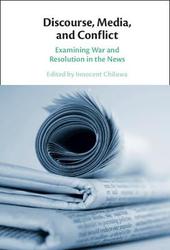
|
Discourse, Media, and Conflict: Examining War and Resolution in the News
Hardback
Main Details
| Title |
Discourse, Media, and Conflict: Examining War and Resolution in the News
|
| Authors and Contributors |
Edited by Innocent Chiluwa
|
| Physical Properties |
| Format:Hardback | | Pages:320 | | Dimensions(mm): Height 235,Width 158 |
|
| Category/Genre | linguistics
Semantics |
|---|
| ISBN/Barcode |
9781316513408
|
| Classifications | Dewey:070.4333 |
|---|
| Audience | |
|---|
| Illustrations |
Worked examples or Exercises; Worked examples or Exercises
|
|
Publishing Details |
| Publisher |
Cambridge University Press
|
| Imprint |
Cambridge University Press
|
| Publication Date |
28 April 2022 |
| Publication Country |
United Kingdom
|
Description
Bringing together contributions from a team of international scholars, this pioneering book applies theories and approaches from linguistics, such as discourse analysis and pragmatics, to analyse the media and online political discourses of both conflict and peace processes. By analysing case studies as globally diverse as Germany, the USA, Nigeria, Iraq, Korea and Libya, and across a range of genres such as TV news channels, online reporting and traditional newspapers, the chapters collectively show how news discourse can be powerful in mobilizing public support for war or violence, or for conflict resolution, through the linguistic representation of certain groups. It explores the consequences of this 'framing' effect, and shows how peace journalism can be achieved through a non-violent approach to reporting conflict. It will therefore serve as an essential resource for students, scholars and experts in media and communication studies, conflict and peace studies, international relations, linguistics and political science.
Author Biography
Innocent Chiluwa is Professor of English Linguistics (Discourse Analysis) and Media/Digital Communications in the Department of Languages & General Studies, Covenant University, Ota (Nigeria). His recent publications include Discourse and Conflict (Palgrave Macmillan, 2021), and Activism, Campaigning and Political Discourse on Twitter (Nova Science, 2019).
|